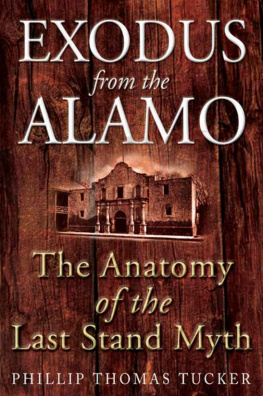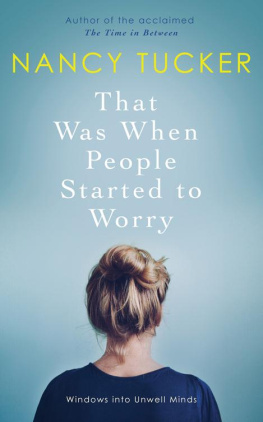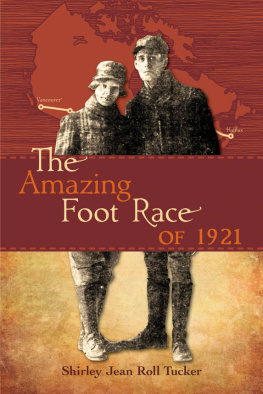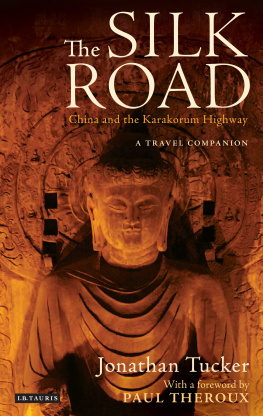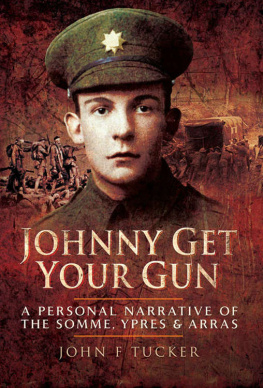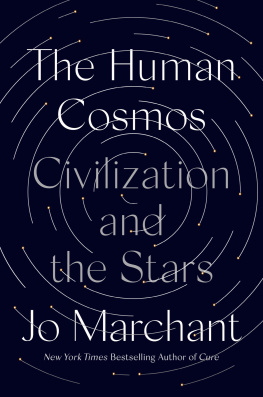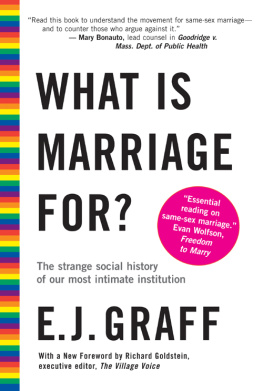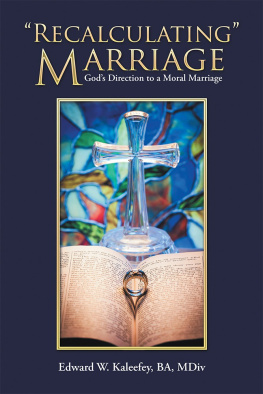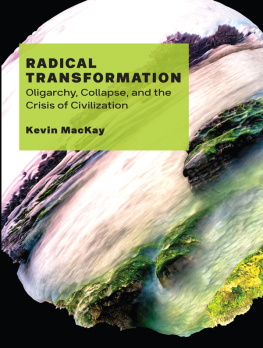Tucker - Marriage and Civilization How Monogamy Made Us Human
Here you can read online Tucker - Marriage and Civilization How Monogamy Made Us Human full text of the book (entire story) in english for free. Download pdf and epub, get meaning, cover and reviews about this ebook. City: New York, year: 2014, publisher: Regnery Publishing, genre: Home and family. Description of the work, (preface) as well as reviews are available. Best literature library LitArk.com created for fans of good reading and offers a wide selection of genres:
Romance novel
Science fiction
Adventure
Detective
Science
History
Home and family
Prose
Art
Politics
Computer
Non-fiction
Religion
Business
Children
Humor
Choose a favorite category and find really read worthwhile books. Enjoy immersion in the world of imagination, feel the emotions of the characters or learn something new for yourself, make an fascinating discovery.

- Book:Marriage and Civilization How Monogamy Made Us Human
- Author:
- Publisher:Regnery Publishing
- Genre:
- Year:2014
- City:New York
- Rating:3 / 5
- Favourites:Add to favourites
- Your mark:
- 60
- 1
- 2
- 3
- 4
- 5
Marriage and Civilization How Monogamy Made Us Human: summary, description and annotation
We offer to read an annotation, description, summary or preface (depends on what the author of the book "Marriage and Civilization How Monogamy Made Us Human" wrote himself). If you haven't found the necessary information about the book — write in the comments, we will try to find it.
Tucker: author's other books
Who wrote Marriage and Civilization How Monogamy Made Us Human? Find out the surname, the name of the author of the book and a list of all author's works by series.
Marriage and Civilization How Monogamy Made Us Human — read online for free the complete book (whole text) full work
Below is the text of the book, divided by pages. System saving the place of the last page read, allows you to conveniently read the book "Marriage and Civilization How Monogamy Made Us Human" online for free, without having to search again every time where you left off. Put a bookmark, and you can go to the page where you finished reading at any time.
Font size:
Interval:
Bookmark:



Copyright 2014 by William Tucker
All rights reserved. No part of this publication may be reproduced or transmitted in any form or by any means electronic or mechanical, including photocopy, recording, or any information storage and retrieval system now known or to be invented, without permission in writing from the publisher, except by a reviewer who wishes to quote brief passages in connection with a review written for inclusion in a magazine, newspaper, website, or broadcast.
First ebook edition 2014
eISBN 978-1-62157-219-0
The Library of Congress has cataloged the hardcover edition as follows:
Published in the United States by
Regnery Publishing, Inc.
One Massachusetts Avenue NW
Washington, DC 20001
www.Regnery.com
10 9 8 7 6 5 4 3 2 1
Books are available in quantity for promotional or premium use. Write to Director of Special Sales, Regnery Publishing, Inc., One Massachusetts Avenue NW, Washington, DC 20001, for information on discounts and terms, or call (202) 216-0600.
Distributed to the trade by
Perseus Distribution
250 West 57th Street
New York, NY 10107
To the memory of my parents,
Grace and Bill Tucker.
They stayed married.
CONTENTS
It is a good thing when a man and woman choose to live together as husband and wife. It is a joy to their friends, a warning to their enemies, but only they know the true meaning of it.
Homer, The Odyssey
We didnt know much about each other twenty years ago. We were guided by our intuition; you swept me off my feet. It was snowing when we got married at the Ahwahnee. Years passed, kids came, good times, hard times, but never bad times. Our love and respect has endured and grown. Weve been through so much together and here we are right back where we started 20 years agoolder, wiserwith wrinkles on our faces and hearts. We now know many of lifes joys, sufferings, secrets and wonders, and were still here together. My feet have never returned to the ground.
The late Steve Jobss note to his wife on their twentieth anniversary
I n the 1950s, America was a land of Leave It to Beaver, My Three Sons, and Father Knows Best. After centuries in which men had sought their identities as soldiers, as swashbuckling adventurers, pioneers, outlaws, or hard-driving businessmen, a new male role had appeared at the center of the culturethe family man.
The family man was a man who was devoted to his wife and children and worked hard to support them. He didnt harbor vague dreams of running off on wild adventures or abandoning his wife for an affair with a wanton woman. He didnt try to drink away his troubles or hide out in a barroom. In short, he didnt feel trapped in his home.
It has been a mighty struggle to domesticate men. During the late nineteenth and early twentieth century, the great enemy of domesticity had been the demon rum and a good many families had been ruined by a mans propensity to take to the bottle. Betty Smiths iconic A Tree Grows in Brooklyn told the story of a father gradually drifting away from the family to drink. Even as late as the 1990s, Frank McCourts Angelas Ashes tells the exact same story of a father who drinks up his paycheck before making it home every Friday evening and eventually disappears from the family. Although it is now remembered as a remnant of American Puritanism or a hopelessly outdated effort at social engineering, Prohibition was actually a movement of middle-class women attempting to hold lower-class men to the responsibilities of supporting their wives and families.
In the late 1930s, James Thurber touched the national psyche with his story of the mild-mannered Walter Mitty, whose pocketa-pocketa dreams of heroism were regularly interrupted by the demands of his nagging wife. In a famous New Yorker cartoon, Thurber depicted a poor Walter-Mitty type coming home from work to find his whole house morphed into his wife about to envelop him.
The generation that came of age in the 1950s, however, was different. They had fought a war in their youth and sowed some wild oats and now they were ready to settle down. The Man in the Gray Flannel Suit, the iconic image of the decade, tells the story of a young World War II veteran who has fathered an illegitimate child in Italy but comes back to America, marries, and settles into suburban life. The perpetual narrative of the era was that marriage and family were the ultimate goal of life and could be attained by anyone.
The statistics backed it up. More than 75 percent of households were occupied by married couples. Illegitimacy was at a minuscule 5 percent, and more than 80 percent of white children were living with both natural parents. Among African Americans the figures were slightly lower but not outrageously different. Illegitimacy rates were around 10 percent, and 70 percent of children were living with two parents. The phenomenon of single motherhood was virtually unknown.
Certainly there were the inevitable affairs and infidelities, the dissatisfied husbands, the frustrated wives, the closet alcoholics, the mothers who suffered nervous breakdowns, the children who grew up hiding some family secretall the vicissitudes of life. As Tolstoy had written seventy-five years before, All happy families are alike; each unhappy family is unhappy in its own way.
Yet the overwhelming message from the popular cultureand the one the public took to heartwas the story that marriage worked. There was a girl for every boy and a boy for every girl. In 1955, the Academy Award went to Paddy Chayefskys Marty, about a Bronx butcher, a fat, ugly little man, who is still single after all his younger brothers and sisters have married and hangs out every night with his buddies who spend their time asking, So waddaya feel like doing tonight? I dont know, Ang. Wadda you feel like doing? At the insistence of his desperate mother, Marty finally goes to a Saturday night dance hall she tells him will be loaded with tomatoes. There he meets a lonely schoolteacher who has been ditched by her date. They find solace in each other, however, and soon the emotional spigots are gushing. I cant shut my mouth, Marty marvels as he walks her home. I cant stop talking! When he gets back with his buddies, however, word has gotten around that he really got stuck with a dog on Saturday. Soon they shame him into giving up the idea of calling her for another date. When the usual banter begins again, thoughWhadda you wanna do tonight, Angie? I dont know, whadda you wanna do?Marty blows up. Im going to call her up and ask her out. And then Im going to call her up and ask her out again. And then Im going to get down on my knees and beg her to marry me. The movie ends with Marty dialing her number in the phone booth.
In ninety-four minutes, Chayefsky had laid out the credo of the society: a girl for every boy, a boy for every girl. Marriage and domesticity were for everyone, even a fat, ugly little butcher from the Bronx.

In 2012, Charles Murray, who had brought attention to the breakdown of the African American family in his 1984 book Losing Ground, published a new report charting the breakdown of the white working-class family entitled Coming Apart
Next pageFont size:
Interval:
Bookmark:
Similar books «Marriage and Civilization How Monogamy Made Us Human»
Look at similar books to Marriage and Civilization How Monogamy Made Us Human. We have selected literature similar in name and meaning in the hope of providing readers with more options to find new, interesting, not yet read works.
Discussion, reviews of the book Marriage and Civilization How Monogamy Made Us Human and just readers' own opinions. Leave your comments, write what you think about the work, its meaning or the main characters. Specify what exactly you liked and what you didn't like, and why you think so.

